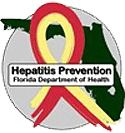It's a New Day in Public Health.
The Florida Department of Health works to protect, promote, and improve the health of all people in Florida through integrated state, county, and community efforts.
Hepatitis C Information
Florida Department of Health in Pinellas County, Available 24 hrs/day
Modes of Transmission
Hepatitis C is found in blood, and can be spread by:
- Sharing injection drug equipment
- Blood transfusion or organ transplant before 1992
- Receiving clotting factor concentrates before 1987
- An infected mother to her infant during delivery
- Occupational exposure through needle stick
- Sexual contact (rarely)
A few major research studies have not shown Hepatitis C to be spread through licensed, commercial tattooing facilities. However, transmission of Hepatitis C (and other infectious diseases) is possible when poor infection-control practices are used during tattooing or piercing. Body art is becoming increasingly popular in the United States, and unregulated tattooing and piercing are known to occur in prisons and other informal or unregulated settings. Further research is needed to determine if these types of settings and exposures are responsible for Hepatitis C virus transmission.
Symptoms
The incubation period for hepatitis C is 2 to 26 weeks, with an average of 6 to 9 weeks.Acute Hepatitis C

People who are infected with hepatitis C are usually asymptomatic. However, if a patient has acute hepatitis C, symptoms may include:
- Jaundice
- Dark urine
- Light stool
- Fever
- Nausea
- Vomiting
- Fatigue
- Abdominal pain
- Anorexia
Chronic Hepatitis C
Chronic hepatitis C refers to an infection where the body is not able to eliminate the virus. Most of those infected are asymptomatic and it may take 10-30 years from the original time of infection to recognize chronic hepatitis C, about 20 years to recognize cirrhosis, and 30 or more years to recognize liver cancer.Testing
| Anti-HCV by EIA | Anti-HCV by RIBA | Qualitative HCV-RNA | Interpretation |
|---|---|---|---|
| + | + | + | Acute infection |
| + | + | - | Resolved infection or intermittent viremia |
| + | - | - | False-positive EIA |
| - | - | + | False negative anti-HCV (early infection or immunocompromised host) |
Treatment
Treatment options for hepatitis C are determined by blood test, biopsy results, and other factors, and are not based solely on the presence of symptoms, since the disease is typically asymptomatic.
- Interferon: injection medication given to patients with elevated enzymes for 6 or more months, and who have detectable antibody to hepatitis C. The treatment may normalize liver enzyme levels after about three months of therapy for 40-50% of patients.
- Ribavirin: is given by mouth in combination with alpha interferon, and the length of treatment is determined by the physician.
- Combination of Interferon and Ribavirin: generally when treating patients for HCV the two treatments are given together, and is considered the most effective treatment for reducing the HCV viral load.
- Pegylated Interferon: a form of interferon, given once a week. The pegylation of the interferon delays clearance rate in the body, and maintains higher interferon levels in the blood.
Vaccination and Prophylaxis
There is no vaccine currently available for the hepatitis C virus.Pregnancy and Perinatal Issues
Transmission Through Breast Milk:
It is not currently known if hepatitis C can be transmitted through breast milk; there is not sufficient information to determine if there is an adequate amount of the virus present in breast milk to pose a high risk to the infant. Generally, hepatitis C positive women are advised that they may breast-feed.
Co-infection
HCV/HIV Co-Infection means a person is infected with both the Hepatitis C virus (HCV) and Human Immunodeficiency Virus (HIV). There are an estimated 400,000 persons co-infected with HCV/HIV. Intravenous drug use seems to increase the risk of co-infection. It's estimated that 60%-90% of people who contracted HIV from intravenous drug use also have HCV.
HCV/HIV Similarities:
- High levels of viral replication
- Cause of chronic infection that can persist for many years
- Most people do not experience symptoms early in the course of infection
How Do HCV and HIV Affect One Another?
Because HIV diminishes the ability of the immune system to fight off infection, it speeds up the rate of liver damage caused by HCV. This places the co-infected patient at a greater risk for cirrhosis, liver cancer, and liver failure than persons infected with HCV alone.
One of the functions of the liver is to process medications. It is very important that those patients co-infected with HCV/HIV take precautions to take care of their liver.



Connect with DOH